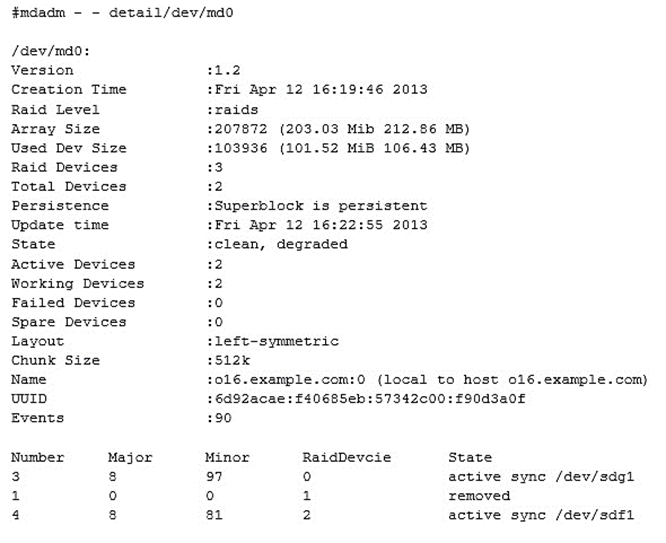Oracle 1z0-100 Exam Practice Questions (P. 2)
- Full Access (141 questions)
- One Year of Premium Access
- Access to one million comments
- Seamless ChatGPT Integration
- Ability to download PDF files
- Anki Flashcard files for revision
- No Captcha & No AdSense
- Advanced Exam Configuration
Question #6
Examine this extract from the /etc/ssh/sshd_config file:
passwordAuthentication no
What is the effect of this parameter settings on the use of openSSH commands on both the client and server?
passwordAuthentication no
What is the effect of this parameter settings on the use of openSSH commands on both the client and server?
- APasswords are not required and no ssh-keygen is required either. Only passphrase are required.
- BClient users whose keys are not in the authorized_keys file on the server are unable to use passwords to authenticate themselves to the server.
- CThe ssh daemon does not ask for a password before starting or stopping the sshd service.
- DClient users whose keys are not in the authorized_keys file on the client are unable to use passwords to authenticate themselves to the server.
Correct Answer:
B
If you set PasswordAuthentication to no, you will no longer be able to use a login and password to authenticate and must use a login and public key instead (if
PubkeyAuthentication is set to yes).
B
If you set PasswordAuthentication to no, you will no longer be able to use a login and password to authenticate and must use a login and public key instead (if
PubkeyAuthentication is set to yes).
send
light_mode
delete
Question #7
Which four statements are true about software on the Oracle Public YUM server?
- AIt contains Oracle Linux installation ISO images.
- BIt contains Oracle Linux binary RPM packages.
- CIt contains Oracle Linux errata packages.
- DIt contains Oracle Linux source RPM packages.
- EIt contains beta Oracle Linux software packages.
- FIt does not contain Unbreakable Enterprise Kernel packages.
Correct Answer:
BCDF
The Oracle public yum server offers a free and convenient way to install the latest Oracle Linux packages as well as packages from the Oracle VM installation media via a yum client.
Oracle provides all errata and updates for Oracle Linux via the Public Yum service, which includes updates to the base distribution, but does not include Oracle- specific software.
F: By default, all new installations of Oracle Linux 6 Update 5 are automatically configured to use the public yum update service. If you subsequently register the system with ULN, the public yum service is automatically disabled.
BCDF
The Oracle public yum server offers a free and convenient way to install the latest Oracle Linux packages as well as packages from the Oracle VM installation media via a yum client.
Oracle provides all errata and updates for Oracle Linux via the Public Yum service, which includes updates to the base distribution, but does not include Oracle- specific software.
F: By default, all new installations of Oracle Linux 6 Update 5 are automatically configured to use the public yum update service. If you subsequently register the system with ULN, the public yum service is automatically disabled.
send
light_mode
delete
Question #8
This MDADM output:

Which two aspects can be determined from this output?

Which two aspects can be determined from this output?
- AA device failed and has been removed from this RAID set.
- BIt is no longer possible to write to this RAID set.
- CRead and write performance is no longer optimal on this RAID set.
- DThis RAID set was built without a spare device.
- EOnly Write performance is no longer optimal on this RAID set.
Correct Answer:
AD
AD
send
light_mode
delete
Question #9
Examine the command on its output:
[root@FAROUT ~] # modprobe v nfs
Insmod /lib/modules/2.6.39-100.0.12.e16uek.x86_64/kernel/fs/nfs_common/nfs_acl.ko insmod /lob/modules/2.6.39-
100.0.12.e16uek.x86_64/kernel/net/sunrpc/auth_gss/auth_rpcgss.ko
Insmod /lib/modules/2.6.39-100.0.12.e16uek.x86_64/kernel/fs/fscache/fscache/ko
Insmod /lib/modules/2.6.39-100.0.12.e16uek.x86_64/kernel/fs/locked.ko
Insmod /lib/modules/2.6.39-100.0.12.e16uek.x86_64/kernel/fs/nfs/nfs.ko
Which two statements are true about the modprobe command?
[root@FAROUT ~] # modprobe v nfs
Insmod /lib/modules/2.6.39-100.0.12.e16uek.x86_64/kernel/fs/nfs_common/nfs_acl.ko insmod /lob/modules/2.6.39-
100.0.12.e16uek.x86_64/kernel/net/sunrpc/auth_gss/auth_rpcgss.ko
Insmod /lib/modules/2.6.39-100.0.12.e16uek.x86_64/kernel/fs/fscache/fscache/ko
Insmod /lib/modules/2.6.39-100.0.12.e16uek.x86_64/kernel/fs/locked.ko
Insmod /lib/modules/2.6.39-100.0.12.e16uek.x86_64/kernel/fs/nfs/nfs.ko
Which two statements are true about the modprobe command?
- AIt will load the nfs module if all the modules upon which it depends have been loaded.
- BIt displays the dependency resolution for the nfs module and loads all the modules upon which nfs depends before loading the nfs module.
- CIt verifies that the nfs module and all other modules that depend on the nfs module are installed.
- DIt displays the dependency resolution that would occur if the nfs module were to be loaded using modprobe nfs.
- EIt only loads the nfs module if all the modules upon which it depends have not been loaded yet.
Correct Answer:
AB
References:
AB
References:
send
light_mode
delete
Question #10
What is the main advantage of the Oracle Unbreakable Enterprise Kernel compared with the Red Hat compatible kernel?
- AIt is more secure and, therefore, more difficult to hack.
- BIt has a lower Mean Time Between Failures.
- CIt provides higher availability for applications by reducing Mean Time to Recovery.
- DIt scales better for more CPUS, memory, and Infiniband network connections.
Correct Answer:
D
The Unbreakable Enterprise Kernel, for those who want to leverage the latest features from mainline Linux and boost performance and scalability.
The Red Hat Compatible Kernel, for those who prefer strict Red Hat kernel ABI (kABI) compatibility.
D
The Unbreakable Enterprise Kernel, for those who want to leverage the latest features from mainline Linux and boost performance and scalability.
The Red Hat Compatible Kernel, for those who prefer strict Red Hat kernel ABI (kABI) compatibility.
send
light_mode
delete
All Pages
